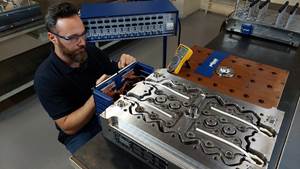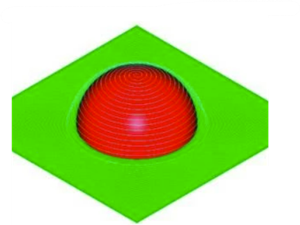Inspection Services Help Moldmaker Push the Envelope
“As technology moves forward, to be able to design and produce these parts you must be able to prove to the customer, through your inspection results, that they will work.”
Less than four inches long, the item Gary Johansson holds looks as if it might be the clip of a pen or a piece broken from a plastic model. In reality, it is the cartridge for a surgical stapler small enough to suture veins. “Let other companies make coasters and Frisbees,” Johansson says. “We take on projects others say can’t be done. That’s a testament to our capabilities, new machines and talented people.”
Johansson is Vice President, Quality for Matrix Tooling Inc. in Wood Dale, IL. Matrix bills itself as a “one-stop shop” – services include mold design, precision moldmaking, close-tolerance injection molding, micromolding, overmolding and specialty tooling. The facility even has a clean room (a necessity, considering that about 70 percent of Matrix’s business is in the medical arena.) However, what really sets Matrix apart is the company’s extensive inspection and testing capability.
“It’s unusual for a shop our size (about 50 employees) to have the inspection capability that we have,” Johansson says. “Our customers like the fact that they can come in with a concept, or a piece part print, and all the work needed to make that piece a reality is under one roof.”
The company views its inspection capabilities as key to attracting highly technical jobs. “The envelope keeps getting pushed—thinner wall stock, for instance,” he says. “Inspection is not always about finding our mistakes, or finding the designer’s mistakes; sometimes it’s about finding a way to make things work. We use it to troubleshoot projects in-process. The inspection work we do actually helps change the production path—we can make design or material changes to make sure the project ends up where we want it to be.”
Matrix was started in 1978 with seven employees; today, the company operates in a 30,000 square-foot facility running three shifts, five days a week. They also do “lights out” machining with EDMs and machining centers. Company ownership constantly invests in new technology; their most recent purchase is a 3D printer.
That commitment to technology helps Matrix build business, Johansson says. “We have a CSS machine— a cross-section scanner (a patented inspection technology by CGI of Eden Prairie, MN)—on the floor, and we’re looking to purchase a CT (Computed Tomography) scanner,” he explains. “The CSS machine is fantastic, but it is limited to plastic. A CT scanner works with mass—that would allow us to scan, for instance, a stainless steel metal-injected molded part with a plastic overmold. With our CSS, we can have hard data for customers within 24 hours; with the CT scanner, we’ll be able to condense that time much further.”
Rapid feedback is something that sets Matrix apart, says Johansson. “We combined a mini-DVD player with a 3D stereoscope so when a part comes off the press—while it’s literally still warm in our hands—we can make movies, take snapshots, and (using a web interface like Glance or Go-To-Meeting) we can talk on the phone with customers as they view their part under the microscope.”
While Matrix strives to provide a full range of services, customers are free to choose which they want. “We’ll build a tool and ship it; we’ll build a tool and certify it; we’ll do bridge molding. We also do inspections for other companies – they send us the plastic parts and we do the inspection. That’s an entirely separate business opportunity,” Johansson says.
“As technology moves forward, to be able to design and produce these parts you must be able to prove to the customer, through your inspection results, that they will work,” he says. “When we’re able to do something cutting edge, it’s very rewarding. Our parts allow doctors to perform beating heart surgeries—they can do the suturing in seconds, rather than 20 minutes. To be part of that is really cool.”
Related Content
What is Scientific Maintenance? Part 2
Part two of this three-part series explains specific data that toolrooms must collect, analyze and use to truly advance to a scientific maintenance culture where you can measure real data and drive decisions.
Read MoreBreaking Down 3D Scanning in Moldmaking
Identifying 3D scanning requirements and implementing the appropriate technology.
Read More5 Hot Runner Tips for Moldmakers and Molders
Best practices for initial hot runner tryouts and effective preventive maintenance.
Read MoreRead Next
How to Use Continuing Education to Remain Competitive in Moldmaking
Continued training helps moldmakers make tooling decisions and properly use the latest cutting tool to efficiently machine high-quality molds.
Read MoreReasons to Use Fiber Lasers for Mold Cleaning
Fiber lasers offer a simplicity, speed, control and portability, minimizing mold cleaning risks.
Read MoreHow to Use Strategic Planning Tools, Data to Manage the Human Side of Business
Q&A with Marion Wells, MMT EAB member and founder of Human Asset Management.
Read More

















